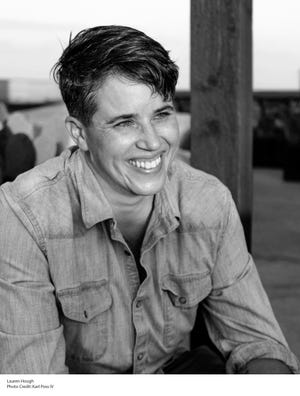
Lauren Hough was up until 3 a.m. watching Twitter on Monday night. By morning, it would be publication day for the Austin author’s acid-witted debut book, “Leaving Isn’t the Hardest Thing,” which meant that a lot of things she used not to talk about would soon be on bookstore shelves across the country.
“I don’t know, it’s wild. You write this (expletive) — it’s hard to imagine anyone reading it, or you’d stop writing,” Hough says. “And now everyone out there is telling me about it. It’s just a very strange feeling.”
You might know Hough from Twitter — more than 66,000 followers strong — or from her viral 2018 essay for Huffington Post, titled “I Was A Cable Guy. I Saw The Worst Of America.” In her new collection of essays, which includes that story, she recounts a whirlwind life. Born in Berlin, she grew up as a global nomad in the infamous Children of God cult, where sexual abuse was common in houses packed with children. She also spent some time living with her grandma, “Amarillo’s sole liberal,” in the Panhandle. Hough, who is a lesbian, later joined the Air Force in the era of “Don’t Ask, Don’t Tell” and faced harassment and death threats.
Love, literature and Leslie:50 years of BookPeople stories
Life took her to Washington, D.C., where she became a bouncer at a gay nightclub. Also along the way: a period of homelessness, a harrowing stay in jail, a service call to Dick Cheney’s house, friendship with actress Cate Blanchett (who helps narrate the audiobook of Hough’s memoir) and reconnecting with others who grew up in the same cult.
We talked to Hough the morning “Leaving Isn’t the Hardest Thing” was released. This conversation has been edited for length and clarity.
American-Statesman: Hey, first of all, happy publish day. I feel like you should be popping Lone Stars or something instead of talking to me.
Lauren Hough: I should be! It’s the (expletive) pandemic. Pub day is kind of the same. We might sneak out to a Barnes and Noble later and see if we can see the book.
How are you feeling about publication?
Pretty good. I think I ran out of all the really gross emotions last week, when I was doing that fun waves thing where you have every possible feeling and then no feelings and cycling through them every 10 minutes. Spent a lot of time hiding under a blanket watching “Schitt’s Creek,” but it’s medicinal.
What brought you to Austin?
In a way, it feels a little bit to me like Berlin. If you went to high school in Amarillo, Austin’s sort of the mecca where you’re gonna get to go and be yourself. It’s an exciting city you want to go to and live.
Nobody fits in in Austin, and everybody fits in in Austin. It’s just sort of the haven for all the hippies, weirdos and freaks, if you fall in any one of those categories. Hopefully you can avoid some of the tech bros.

You have a lot of killer lines in this book. One is later on, where you say how significant it is to find “a witness to your life.” When you’re writing a memoir, I imagine that it’s an act of relation in some ways. Do you hope that your book can provide that sort of recognition for people?
I hope so. Maybe that’s why we write books in the first place, because we’re always trying to connect. That would be the best thing to come of it. Some kid out there reads it and recognizes something about themselves and doesn’t feel so alone.
I want to be like very sensitive and not draw any direct comparisons, because everyone’s experiences are their own, but I grew up a repressed gay boy in the evangelical church in Texas. So a lot of what you wrote in the book — again, while not the same experiences — lit up my brain with some similar ideas about these big religious structures. Have you found that you can make those broad connections with people that are from a different background but had a common vibrational frequency drilled into their head as a kid?
Absolutely. I mean, they, they raised us to be so (expletive) ashamed of ourselves, of our paths, of every aspect of our lives. When we finally start talking about it — that’s one of the things that shame did to us, is keep us so isolated from being able to talk to one another, to be able to share your experience, to be able to gain some understanding from someone else’s experience.
I thought, and I think we all do in a way, that our own paths are so specific, and no one will ever understand. And it turns out, when you start talking, it’s like coming out of the closet. Suddenly, there’s this whole community available to you. That shame keeps you from joining the community.
You write a lot about how the environment you were raised in kept you separate from the world, which was seen as this extant thing — us vs. them. Do you ever catch yourself with some old frame of mind from a long time ago that’s not useful to you anymore? Like, “Why did that pop up?”
Yeah, they still happen. I mean, they’ve planted these landmines in us, and we trip it at the weirdest, least helpful times. Especially in relationships, and just the way we have been taught to communicate with one another. You can go to a whole lot of therapy, and then (it’s often like), “There’s another landmine.”
I think the most recent one for me is just someone saying, “Can I talk to you?” I immediately go into I’m-in-trouble mode, and you’re entering into an argument within a relationship about, like, who emptied the dishwasher last. I’m-in-trouble mode isn’t exactly helpful there. It immediately makes you defensive. You immediately start bargaining and trying to get out of trouble, when it’s just, (expletive) empty the dishwasher. This didn’t have to be a whole thing. It’s the gift that keeps on giving.
More entertainment:An ode to a monkey and lizard screaming at each other
You write a lot about having to smile as a kid and having to be positive. When you’re raised in a certain religious environment, it’s not conducive to conflict resolution.
(laughs) Uh, nope!
Yeah, so any “negative” feeling or interaction, it’s just like, “Oh, well, I have to leave now, because I don’t know what to do with this.” How did you pick up some ability to confront things like conflict?
It might be helpful to be gay coming out of that environment, because you kind of know the big thing was a lie pretty early on. OK, you’re gay, you cannot change this. Hopefully you figure that out earlier than later. It’s like when they lied to you about marijuana in high school. You figure if they lied to you about marijuana, they probably lied to you about other things, too.
One thing that I did notice that you were very careful about in your writing, specifically in the essay about jail and also in writing about encounters with police, was to be very conscious about your experience as a white person not being the same experience that people of color have. What helped you realize that disparity?
I think it goes back to what I said earlier. If you were raised evangelical, or in a cult, you realize you have to relearn a whole lot of things pretty early on. … The Civil War (not being) the war of northern aggression was a pretty early wake-up.
I don’t know how to teach someone to be anti-racist. It just doesn’t help anybody if we don’t recognize the differences in the way we’re treated, in the way every interaction goes.
More:‘Inbetween Girl’ filmmaker Mei Makino’s Texas talent, from camera kid to SXSW star
Another line you wrote that I really liked was, “Poverty makes you mean.” People who go into writing — having a safety net really helps you to pursue that kind of work. Can you tell me a little about how your creative life and pursuing writing as a profession have been affected by not having that?
The only reason I can do this is I get disability payments from the Air Force, or from the V.A., every month. Sort of like the universal basic income that we dream of, except you have to join the military and have bad things happen to you. … I don’t know how people with kids and day jobs get any writing done whatsoever. I could barely write with a dog. As soon as you get going, he wanted to play. … There’s so many obstacles placed in anyone’s path to climb up and then be able to do this for a living.
One of your friends is Elizabeth McCracken, one of our prominent local authors, and you thank her in your acknowledgments for helping with the book.
Oh, God, I love her so much. I mean, I think that was always the dream of the internet that, you know, a kid from nowhere could talk to the prominent writer. In this case, Elizabeth McCracken, who is just so friendly and down to earth. I was failing out of creative writing (at Austin Community College) when I met her and had just failed to sell a book and was pretty close to giving up. She took me out for drinks and explained why you should have an agent who likes your writing and how to get from A to B.
It’s just been every step of the way, even with copy editing. I still have that little voice on my shoulder, because I didn’t go to school, that I’ll just agree to any copy edits. She was like, “If you’re not sure about something, send it to me and I’ll let you know when you can fight back and when too many semicolons is gonna make you sound like you’re talking in an English accent suddenly.” She’s just funny and kind, and I cannot possibly say enough good things about her.
You worked at the Iron Bear, the downtown Austin gay bar, is that right? You have any good bar stories?
Don’t work at a gay club when “A Star is Born” comes out. Karaoke night is going to get really old, really fast.
I don’t know any horror stories. It was a fun place to work. They let me sit out there and read and write. My (expletive) blew up when the cable guy essay came out. I was standing outside talking on the phone to editors and agents and producers: “Wait, hold on, I gotta get that leather daddy’s ID, hold on.” There was an entire month when I came in an hour late. But I mean, I brought Cate Blanchett to the bar. So I feel like that should make up for some of it.
Well, can I ask about Cate Blanchett and how you got to know her?
Yeah, she reached out … and wrote me this mind-blowing email. I don’t really know what to say about her. These are not sentences that I thought I’d speak or write at any point in my career. She’s just warm and funny and down to earth and will help you pick the cover for your book. Because I mean, if you do know the walking embodiment of good taste, she’s probably a good person to ask.
If you go
Lauren Hough at BookPeople
The author will participate in a virtual discussion about “Leaving Isn’t the Hardest Thing” with Heather Havrilesky at 6 p.m. on April 29. The event, presented by BookPeople, is free, but copies of the book are available to purchase. Go to bookpeople.com for more information on how to tune in.








